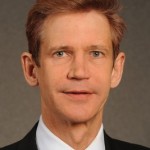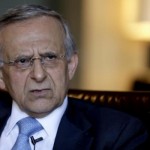By Joshua Kyle Miller
On Monday, October 28th, I attended an engaging and insightful event hosted on George Washington University’s campus by the International Affairs Society and the American Iranian Council titled “New Leadership in Iran: Time for Rapprochement?” The expert panel consisted of four professionals: Ambassador William Miller, Board Member of the American Iranian Council; Dr. Patrick Clawson, Director of Research, The Washington Institute for Near East Policy; Professor Hooshang Amirahmadi, Professor at Rutgers University & Founder; and Dr. Andrew Parasiliti, Editor & CEO, Al-Monitor.com.
Each panelist opened the discussion by giving remarks for ten to fifteen minutes about the recent developments in Iran and the latest rounds of engagement between Iran and the West.
Ambassador William Miller broke down the facts of the Iranian nuclear program from a historical perspective. He reflected back to his days as a young junior diplomat when he was stationed in Tehran in 1959, when he toured the country with the IAEA Director at the time to develop a energy plan to fuel Iran’s needs. The plan consisted of an array of fueling methods, but emphasized the construction of 22 nuclear power plants. Ambassador Miller indicated that “this had been America’s vision for Iran in 1960, the shah had embraced it then, and the revolutionary government has continued to embrace it since 1979.” Building from this, Ambassador Miller declared that evidence suggests that Iran can pursue a peaceful path; it joined the Nonproliferation Treaty (NPT) as one of the first signatories and has continued to recognize the NPT under the revolutionary government (the last additional protocol notwithstanding), and had refused to retaliate against Saddam Hussein in the Iran-Iraq war with weapons of mass destruction. Lastly, he identified that Iran’s Supreme Leaders have said they have no interest in nuclear weapons which is buttressed by their religious and ethical views.
Dr. Patrick Clawson followed by taking a different approach, he highlighted three barriers that remain in the event of a nuclear agreement. First, Iran is a leading state sponsor of terrorism, especially through its ties through Lebanese-based Hezbollah. Dr. Clawson asserted that he did not envision Iran from breaking its relationship with Hezbollah, especially with the volatile situation in Syria. Second, President Rouhani and his cohort were the last remnants of the generation that had intimate contact with the West; the younger generation destined to fill the senior roles lack that key experience. Third, the gravest danger to Iran in the eyes of the Supreme Leader Ayatollah Khamenei is “the cultural invasion of the West.” This notion is what characterizes the Ayatollah’s mentality towards the West, because western culture “perverts Iranian life and religious sensibility.” Clawson declared that the Ayatollah viewed the cultural invasion as a means to invoke a “soft revolution” in which the government would gradually be overthrown through the establishment of NGOs, people to people contact with the West, and social media.
Professor Amirahmadi took to the podium and posed the question, “Will engagement lead to a settlement?” Amirahmadi responded that the threat of or actual implementation of more sanctions on Iran would not coerce Iran to capitulate, but would only embolden them and result in an increase in centrifuges. He went on to assert that “the ideal situation has arrived” for Iran and the West to come to an agreement in which Iran could assent to the West’s intrusive monitoring conditions and in exchange could retain prestige by preserving its nuclear program. The means to do this are a bit trickier, but would entail an incremental approach on sanctions relief characterized by “give and take”; this is further complicated by the lack of mutual trust and confidence between the West and Iran, and will require diplomatic tact on both sides. Above all, Amirahmadi asserted that the biggest obstacle for success was the limitation of time for President Rouhani. “By opening to the West, Rouhani has seriously exposed himself and has made himself vulnerable to his conservative counterparts,” said Amirahmadi. Rouhani has the complex task of “keeping his rivals at bay and pleasing his supporters in a narrow time frame” or else the opportunity for an agreement will be lost.
Dr. Andrew Parasiliti opened remarks by arguing that Iran has been acting as a rational actor. Iran has pursued a nuclear program in a region in which it has many adversaries – a rocky relationship with Pakistan, a non-existent relationship with the United States, an acrimonious relationship with Israel, and a hostile relationship with Saudi Arabia through proxy wars, especially in Syria. From here, Parasiliti took a different perspective by looking at the situation through the lens of the Syrian conflict. Dr. Parasiliti noted the destabilizing nature of the Syrian conflict for the wider region, naming countries like Turkey, Iraq, and Jordan and others who have experienced the cumbersome issues of refugees. He noted that engaging talks with Iran on the nuclear settlement could also lead to cooperation to end the Syrian conflict since Iran supports and supplies Bashar Al-Assad. Dr. Parasiliti stressed the importance of gaining an “understanding” with Iran, as the United States and Iran have with Iraq and Afghanistan. He said, “we may not like the way things are working out in those places or the leaders, but it could be worse.”
All four panelists contributed diverse points to the discussion, enriching the audience’s understanding of the Iranian-American relationship and fostering insightful debate. Despite their differing approaches, all the panelists agreed that this was the ideal opportunity for rapprochement, and that the biggest obstacle to its success was one that we have little control over – time.
The post Event Recap: New Leadership in Iran – Time for Rapprochement? appeared first on American Security Project.






